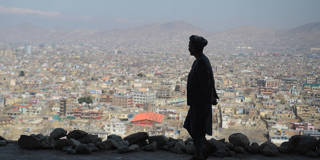Nation-building boils down to “expanding the circle” of moral concern. That is why successful nation-states – large or small, rich or poor – have one thing in common: citizens’ sense of a shared past and future.
LONDON – In the aftermath of the Afghanistan debacle, some claim that Western forces might have succeeded had they just come out of the bunker and engaged more with local groups. Others claim that, in the absence of the civic habits and culture of cooperation required by a functioning state, all efforts at nation-building in places like Afghanistan are destined to fail. Both positions are misleading, if not mistaken.
Exhibit A in the case against the skeptics is that nations have been built, and not just in homogeneous societies like Japan or Scandinavia. India constructed a vibrant democracy despite a traumatic partition, continent-like size, and a plethora of languages and ethnicities. Brazil has a strong national identity and functioning democratic institutions despite sharp income inequality and deep regional and ethnic cleavages. The United States pulled itself together after a civil war that killed one American in 40.
But those three examples are also Exhibit A in the case against the pollyannas: nation-building is no task for foreigners. One would be hard-pressed to find a historical example of a functioning and cohesive nation-state being imported at the barrel of a gun. Mahatma Gandhi, Abraham Lincoln, and Brazilian democrats like Fernando Henrique Cardoso were not just locals; they built local symbols and practices of shared values.

LONDON – In the aftermath of the Afghanistan debacle, some claim that Western forces might have succeeded had they just come out of the bunker and engaged more with local groups. Others claim that, in the absence of the civic habits and culture of cooperation required by a functioning state, all efforts at nation-building in places like Afghanistan are destined to fail. Both positions are misleading, if not mistaken.
Exhibit A in the case against the skeptics is that nations have been built, and not just in homogeneous societies like Japan or Scandinavia. India constructed a vibrant democracy despite a traumatic partition, continent-like size, and a plethora of languages and ethnicities. Brazil has a strong national identity and functioning democratic institutions despite sharp income inequality and deep regional and ethnic cleavages. The United States pulled itself together after a civil war that killed one American in 40.
But those three examples are also Exhibit A in the case against the pollyannas: nation-building is no task for foreigners. One would be hard-pressed to find a historical example of a functioning and cohesive nation-state being imported at the barrel of a gun. Mahatma Gandhi, Abraham Lincoln, and Brazilian democrats like Fernando Henrique Cardoso were not just locals; they built local symbols and practices of shared values.